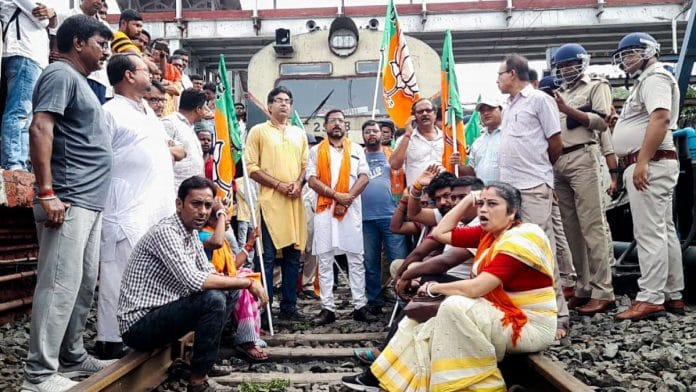The Kolkata rape-and-murder of a doctor at RG Kar Hospital has brought the BJP and TMC back on the warpath. With that, has returned a familiar, naïve sentiment. Everyone is now saying: Let’s not politicise rape.
That’s just lazy thinking.
It’s 2024. The politicisation of rape has been long overdue. In fact, it’s a good thing.
In a country where nothing and nobody moves until the politician does, why only have this exception about not politicising rape? I have grown up in an India where rape was a one-day news, a single column buried in the unturned inside pages of newspapers—if at all.
Delhi gang rape moved the needle, but only a bit. A few rape incidents—not all—have now finally reached the front pages. There is a hierarchy even here. It all depends on where it occurs, who the woman is, how many protestors storm the streets, and what graphic details make it to the TV screens. And of course, how loudly the politicians speak against it.
Partisan politics drives India
When train accidents occur, it is a standard Indian template to politicise them and ask for the resignation of railway ministers. Resignations aren’t just demanded from the train driver or safety officer. It goes all the way to the rail mantralaya. So, it shouldn’t be too unthinkable to ask for a chief minister’s resignation when a man rapes and kills a woman. Women’s safety is as important as train passengers’ safety. That shouldn’t even have to be said. And railway ministers have resigned in the past.
When there is a corruption scandal, nobody says let’s not politicise it. When Pakistani soldiers breached the border at Kargil, resignations were sought.
When rapes are politicised, they stay in the headlines and in public attention for days and weeks; they get discussed in the Legislative Assembly and Parliament; local police rightly come under increased scrutiny; and, most importantly, a whole range of systemic and structural issues are raised like never before. In the Kolkata rape case, the plight of young female doctors and staff, their gruelling work hours, and the lack of infrastructure in the hospitals have suddenly become part of public conversations for the first time.
Partisan politics drives India, Indians, and the unsparing town square of public arguments. When the BJP and ABVP protest against West Bengal CM Mamata Banerjee and ask her to quit, it signals to the citizen that politicians are accountable and can stand to lose their jobs over women’s safety.
When the December 2012 fatal gang rape occurred, then-CM Sheila Dikshit’s resignation was rightly demanded. Even though law and order came under the LG and home ministry, she was the political face of Delhi. UP CM Yogi Adityanath also faced the same demands when the Hathras rape and hurried police-sponsored funeral of a Dalit woman happened.
Selective outrage is integral to partisan politics and democracy. Yes, the BJP will raise an outcry over rape in Opposition-ruled states; and the Opposition will scream their lungs out over a rape in a BJP-ruled state. Imagine a scenario where that doesn’t happen. All the cases will be buried and pushed out of public scrutiny after 24 hours.
Politicians amplify issues, much like the media does.
Also read: Hema Committee is a start. How many reports, careers, lives before we see real change?
Women’s safety is political
In an ideal world, everybody would rage over rapes, no matter where they occur, no matter which party rules the state. That’s a sweet thought to send out on WhatsApp groups in the morning along with your Good Morning message, as you grab your coffee and croissant. But then, in an ideal world, rapes wouldn’t take place at all. That’s not the world we live in. We have to work within all the structural flaws we have learned to live with.
Now, let’s tackle two possible counters to my argument. One is that rapes occur more frequently than train accidents. So, resignations can’t be sought that often. Why not? That is exactly how the notion of moral accountability is supposed to work.
We can’t be patiently waiting for five years for the EVMs to enforce the resignations. And frequent rapes are the problem. Frequent resignations aren’t. A rape case is reported every 16 minutes in India. Unless and until a politician fears job loss between elections, issues like women’s safety will always remain at the bottom of the totem pole.
The other possible question that will arise is: Where does the politicisation of rape lead us? To summary justice and to more and hurried hangings, some will say. By that logic, we shouldn’t have fast-track courts at all. In a country where chronic delays in delivering justice are a universally acknowledged problem, speed is the answer.
The conviction rate for rape cases in India remains a dismal 2.56%. And the question of executions will arise even if no politician speaks up and protests are only made up of those mythical ‘apolitical’ citizens. By the way, there are no apolitical anti-rape protests. The anger is always directed at the ruler and the system.
At this point ‘let’s not politicise rape’ is beginning to sound like the trite ‘not all men’.
Stop demanding the de-politicisation of rape. Women’s safety is political. Deeply so. It should rouse and move politics. It should dethrone governments.
Rama Lakshmi is Editor, Opinion and Ground Reports at ThePrint. She tweets @RamaNewDelhi. Views are personal.
(Edited by Prasanna Bachchhav)







Thanks for the excellent article! Love these words: “Women’s safety is political. Deeply so. It should rouse and move politics. It should dethrone governments.”
Being a writer you must be sensible enough
what is bad in opposing rape every regulatory machinery should feel shame under which command it happened.